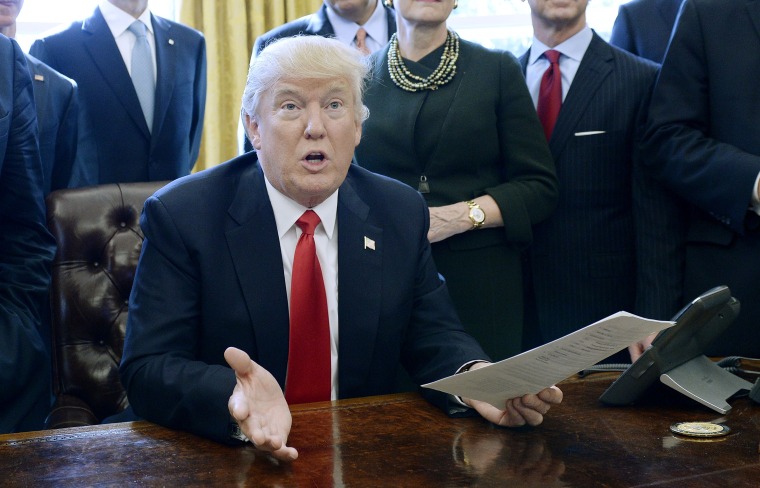Nearly a year ago, Vanity Fair published a piece on the chaos gripping Donald Trump's White House, quoting West Wing officials who described the president as, among other things, "unstable" and "unraveling."
But there was an anecdote in the piece that seems relevant anew:
[S]ome West Wing advisers were worried that Trump's behavior could cause the Cabinet to take extraordinary Constitutional measures to remove him from office. Several months ago, according to two sources with knowledge of the conversation, former chief strategist Steve Bannon told Trump that the risk to his presidency wasn't impeachment, but the 25th Amendment -- the provision by which a majority of the Cabinet can vote to remove the president.When Bannon mentioned the 25th Amendment, Trump said, "What's that?"
I have a hunch the president now knows the answer to that question.
There was a great deal to digest in the New York Times op-ed written by an unnamed senior official in the Trump administration, but while the piece raised a wide variety of concerns, it also made some very specific news: "Given the instability many witnessed, there were early whispers within the cabinet of invoking the 25th Amendment, which would start a complex process for removing the president. But no one wanted to precipitate a constitutional crisis."
If the op-ed is accurate, it's evidence of developments we did not previously know. Chatter about a 25th Amendment remedy to the Trump presidency wasn't limited to pundits and alarmed members of Congress; the topic came up "within the cabinet."
The Atlantic's David Frum wrote the week after the 2016 election, "Twenty-Fifth Amendment to the Constitution. Article 4. We're all going to be talking a lot more about it in the months ahead."
Frum was clearly onto something.
So let's circle back to our previous coverage and answer the question that Trump reportedly didn't know the answer to: what's Article 4 to the 25th Amendment? In the abstract, the amendment itself is about presidential succession, and includes language about the power of the office when a president is incapacitated. But it also creates a constitutional mechanism in the event the president is "unable to discharge the powers and duties of his office."
Under the 25th Amendment, a sitting vice president and a majority of the executive branch's cabinet could, on their own, agree to transfer power out of the hands of a sitting president. At that point, those officials would notify Congress, and the vice president would assume the office as the acting president.
And what if the challenged president wasn't on board with the plan to remove him/her from the office? As Vox explained, "If the president wants to dispute this move, he can, but then it would be up to Congress to settle the matter with a vote. A two-thirds majority in both houses would be necessary to keep the vice president in charge. If that threshold isn't reached, the president would regain his powers."
The intended purpose of the constitutional provision was to address a president with a serious ailment -- say, a stroke, for example -- in which he or she is alive, but unable to fulfill the duties of the office.
It probably wasn't written to deal with a president who seems, to borrow a phrase, "barking mad."
But maybe the intentions of the 25th Amendment's authors aren't paramount. Maybe what matters are the real-world consequences we find ourselves in.
Either way, everyone's new unnamed White House source alerted the public to the fact that members of Trump's cabinet are aware of the constitutional provision, and the possibility of using that legal power was at least considered. That's how far gone this president is.
